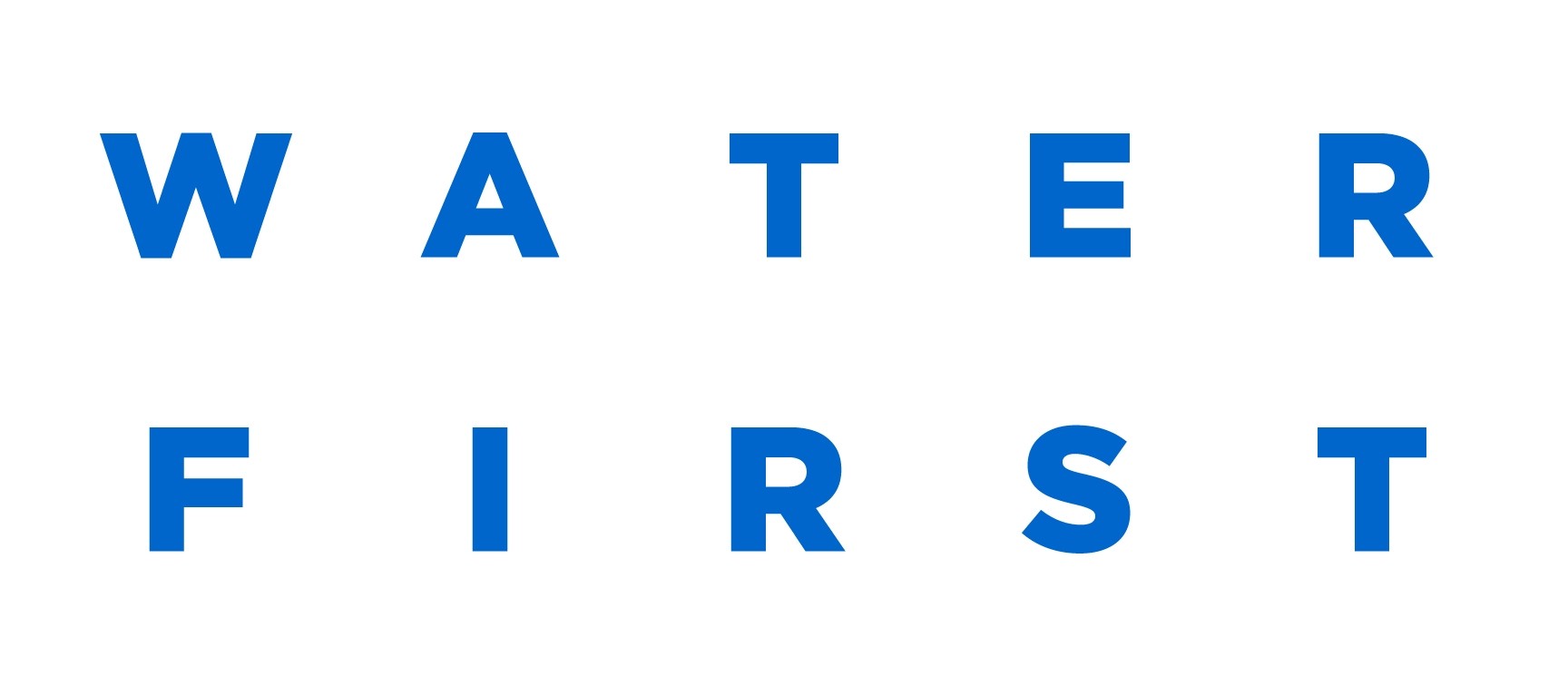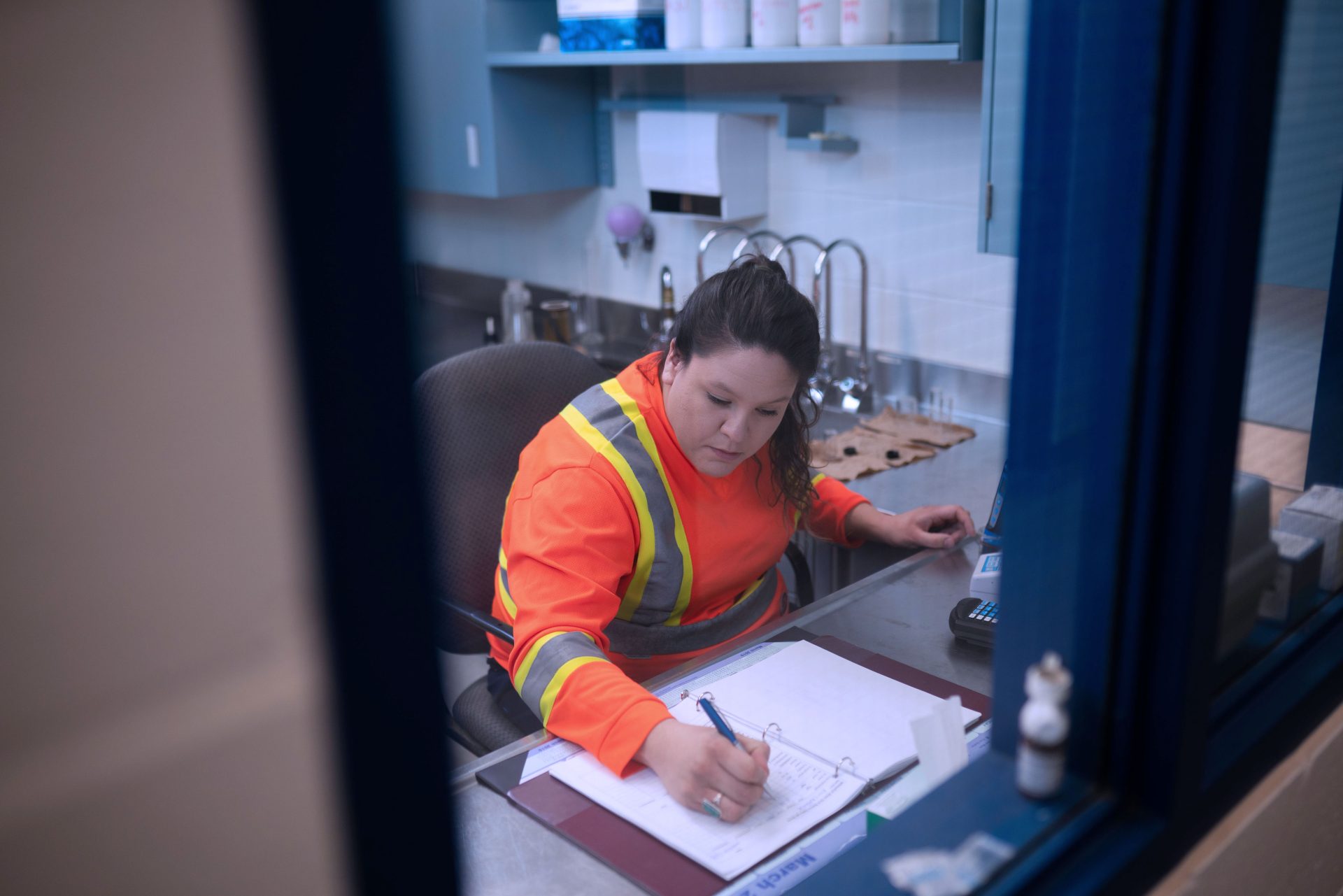Listening and adapting to community needs
2023 Annual Report
“It was humbling to begin the week beside the water, being welcomed by Kookum Shirley’s Thanks Giving Prayer and student-sung honour song.
It brought a clear focus to the rest of the week and a shared goal between us and the students for the rest of the program.”
Tanya Sackaney, Indigenous School Engagement Coordinator
Water First
Adapting to the unique needs and priorities of each community we partner with is a hallmark of Water First’s approach.
Our robust programs are delivered in collaboration with many different communities and partners. We continually refine programs to make them more effective and efficient, and are constantly researching best practices and new approaches in education and training. However, delivering education and technical skills training programs that will have lasting results starts with listening and understanding what a community’s goals are. That’s why we embed flexibility in our planning, allowing us to be responsive and adapt to what each community wants to achieve.
Sometimes, adapting a program to better meet the needs of participants comes down to making minor changes that can have a big impact. This can look like changing the timing of a program module to better suit the needs of participants – like we did with the geographic information systems (GIS) training for our partnership with the Ogemawahj Tribal Council (OTC). Normally, GIS is offered much later in the program, but the community was interested in having interns apply skills right away, so it was moved closer to the beginning of training.
Adaptation can also look like changing the scope of a program after launch. A new collaboration with the Cree Nation Government (CNG) began with a water quality monitoring workshop for participants from the Cree Nation of Waswanipi, similar to previous work with the Cree Nation of Nemaska.
Spotlight Story
Water First began a partnership with Brunswick House First Nation (BHFN) in July 2022 to provide technical training to a team of passionate young participants. The community was interested in establishing a program that could track the effects of climate change on the waters and plants that they most heavily relied on. Water First’s role was to support the team in mastering their field and data collection skills.
The first field season was a great success, thanks to the confidence and capabilities that the team members demonstrated. Santana Vanbuskirk, the team lead, was inspired to continue this project and along with the Lands and Resouces Department, was keen to work with Water First again.
Taking time to understand the community’s vision, the group decided to adjust the climate monitoring program’s 2023 field season, slowing the pace of technical duties to create more space and time for cultural activities like water ceremony, and focusing on monitoring one specific lake – the community’s drinking water source – for contaminants from mining activities.
The 2023 field season – a successful adaptation based on community-led priorities – was ambitious, yet balanced the scientific work with moments to connect with the land and each other.
“My goal for this project is to create climate change awareness in the community and document long term effects of climate change.
I would like to see the Mountbatten Climate Change Project continue to strive for years to come.
Climate change means to me that Mother Earth is in pain and she needs more people to protect the water, the trees, the ground and everything in between.”
Santana Vanbuskirk, Environmental Water Program participant
Brunswick House First Nation
Spotlight Story
Water First began a partnership with Brunswick House First Nation (BHFN) in July 2022 to provide technical training to a team of passionate young participants. The community was interested in establishing a program that could track the effects of climate change on the waters and plants that they most heavily relied on. Water First’s role was to support the team in mastering their field and data collection skills.
The first field season was a great success, thanks to the confidence and capabilities that the team members demonstrated. Santana Vanbuskirk, the team lead, was inspired to continue this project and along with the Lands and Resouces Department, was keen to work with Water First again.
Taking time to understand the community’s vision, the group decided to adjust the climate monitoring program’s 2023 field season, slowing the pace of technical duties to create more space and time for cultural activities like water ceremony, and focusing on monitoring one specific lake – the community’s drinking water source – for contaminants from mining activities.
The 2023 field season – a successful adaptation based on community-led priorities – was ambitious, yet balanced the scientific work with moments to connect with the land and each other.
“My goal for this project is to create climate change awareness in the community and document long term effects of climate change.
I would like to see the Mountbatten Climate Change Project continue to strive for years to come.
Climate change means to me that Mother Earth is in pain and she needs more people to protect the water, the trees, the ground and everything in between.”
Santana Vanbuskirk, Environmental Water Program participant
Brunswick House First Nation
As discussions progressed, CNG identified the need for this training for participants from Ouje Bougoumou and a refresher for Nemaska participants. Our adaptable programs expanded a small workshop with Waswanipi into two weeks of training for thirteen participants, a complete lake survey, and new co-developed water quality monitoring plans for two different Cree communities.
In some cases, adapting a program can mean digging deeper into what a community wants to achieve in the long term. As relationships grow, we gain further insight into what a community’s objectives are, and we can create solutions together. With Innu Nation, our team worked with the community to build a new aquatic department, beginning with consultations and planning for the future, supporting with grant writing, and translating community priorities into a plan.
Water First engages students in outdoor experiential learning opportunities that integrate land-based teaching with guidance from Elders and Knowledge Keepers, water organizations, and community programs. These programs are adapted to local environments, school contexts, and traditions.
This is particularly impactful in a school setting, where students can be inspired by making connections between a water science workshop and something already happening in their school or community. Integration like this was especially evident in our collaboration with the community of Kitigan Zibi Anishinabeg.
Kitigan Zibi School reached out to us about collaborating on a water-themed week that also encompassed World Water Day. The team was able to work with every class from kindergarten to grade 12 at the school, taking each group outside to learn about environmental water quality indicators on the frozen lake. Indigenous Guardians also led two groups of students in looking at the water quality of a natural spring in the community. Learning on the land, and relating the learning to local traditions and contexts, helped to align the program with the community’s own interests and goals.
Spotlight Story
Water First has been partnering with Sagamok Anishnawbek over the past few years on water science programs. Our visit in June 2023 was going to be a major milestone: for the first time in our history, all three Water First program areas – a Schools Program, the Environmental Water Program, and the Drinking Water Program – were set to happen in the same community at the same time.
Things didn’t go exactly as planned, due to the impact of wildfires that were threatening northern Ontario and Quebec. But this change in plans presented an opportunity for the community to come together to address a pressing challenge. And sometimes Water First is lucky to be there, in the community, to support these efforts.
“When you’re working in the field, Mother Nature will do her thing, or other challenges will arise that mean you have to change priorities or adapt plans.
At Water First, we’re led by community-identified priorities. We strive to be flexible, understanding, and supportive – even if all we can do is postpone a program so community members can focus on other priorities.
We are honoured to be able to support community partners in any way we can.”
Mason Prout, Communications & Development Specialist
Water First
Spotlight Story
Water First has been partnering with Sagamok Anishnawbek over the past few years on water science programs. Our visit in June 2023 was going to be a major milestone: for the first time in our history, all three Water First program areas – a Schools Program, the Environmental Water Program, and the Drinking Water Program – were set to happen in the same community at the same time.
Things didn’t go exactly as planned, due to the impact of wildfires that were threatening northern Ontario and Quebec. But this change in plans presented an opportunity for the community to come together to address a pressing challenge. And sometimes Water First is lucky to be there, in the community, to support these efforts.
“When you’re working in the field, Mother Nature will do her thing, or other challenges will arise that mean you have to change priorities or adapt plans.
At Water First, we’re led by community-identified priorities. We strive to be flexible, understanding, and supportive – even if all we can do is postpone a program so community members can focus on other priorities.
We are honoured to be able to support community partners in any way we can.”
Mason Prout, Communications & Development Specialist
Water First
Successful collaborations start with strong relationships, and strong relationships are built on communication, respect, and trust. For Water First, nurturing and strengthening these relationships involves continuous engagement, regular check-ins, and being open to feedback, which all help to ensure that our programs are successful in meeting each community’s unique needs. Through a focus on dialogue, program evaluation, and reciprocal learning, we can support a community in achieving lasting results.


